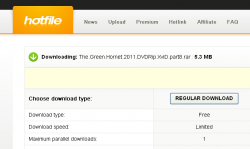Another short one this week. I hope you’ll be understanding, what with the holidays so close, it just doesn’t feel right to do a lot of work. I suspect this feeling will last well into the new year.
On with the WNR.
![]()
So another one down the drain. As you will probably have heard by now, Hotfile is dead. Which makes this the MPAA’s second big anti-piracy victory in as many months, after the closure of isoHunt back in October. And this one didn’t even need a trial.
Hotfile and their lawyers decided that the best course of action was to settle the case a week before the trial was set to start, with the file host agreeing to pay $80 million in damages. Under the deal, the site itself could still operate if they implemented a copyright filtering system. Failing that, the would have to close down. I guess those responsible for Hotfile found the latter to be easier than the former, and Hotfile has been closed permanently.
So that’s one less place where pirated downloads can be gotten, which leaves only several hundred other places that offer the exact same feature and downloads. Another pointless victory in the war against piracy.
Speaking of pointless, DRM. But far from being pointless, it appears DRM did have a use for music sales – it made sure there were less of them!
A new working paper has gone through the figures, done the maths and found that the removal of DRM actually helped to increase digital music sales by 10%. While popular music sales weren’t affected much, “long tail” sales of less well known albums increased by about 30%. The researcher who wrote the report, Laurina Zhang, theorizes that by removing DRM and making it easier to share music, this helped lesser known works to be discovered. This also explains why the top sellers, which are already heavily publicized, didn’t benefit as much from DRM removal.
If I interpret this correctly, then it means that while the removal of DRM was the catalyst, it was sharing (and mostly unauthorized sharing I might add) that actually helped to boost sales. Hmm, something to think about.
And for all the problems with Spotify’s revenue model, perhaps it too has a hand in helping music sales (and other related revenue). Now that would make an interesting study, to see what effect Spotify has on music sales.
![]()
While we wait the conclusion of the epic South Park PS4 vs Xbox One trilogy, the first trickle of Black Friday video game sales data has come out, and it appears that the more expensive Xbox One is winning, at least at Walmart and Target. According to data released by analytics firm InfoScout, the best selling non-portable console at two of the largest retail chains in the U.S. was the most expensive one, the Xbox One. It accounted for 31% of all sales, just ahead of Microsoft’s other console, the Xbox 360, which came in at 30%.
The PS4 and PS3 both came in at 15% each, half as many as their Xbox equivalents. The Xbox 360 was always going to beat the PS3, but the lower PS4 numbers may be due to stock issues.
As for the Wiis, the lesser said the better, at least according to the InfoScout data. The Wii, previously the king of Black Fridays, only managed to be 1% of all sales, while the Wii U wasn’t much better at 6%.
Of course, with both Microsoft and Sony’s consoles being new probably meant that the Black Friday data was slightly unfair to the Wii U. The overall holiday sales will be much more even, and the next holiday’s data would be even more conclusive, given that Nintendo’s big games (your Marios, with or without Karts, Donkey Kongs and Zeldas) would have all been released by then.
And that was pretty much it for the week, I know, not much. And the situation probably won’t improve in the next couple of weeks as others join me in taking their feet off the gas pedal, and dream of sleep-ins, holidays and new toys to place with.
See you next week.



